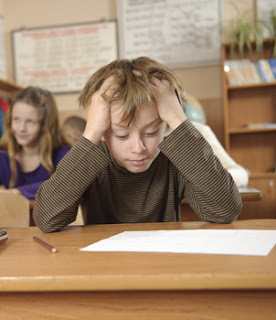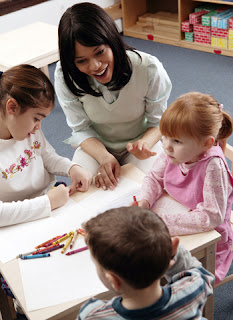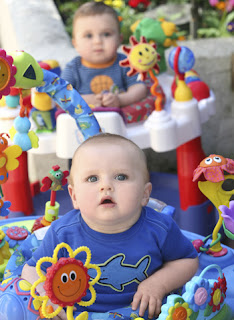Why children fail in school?
Often, we hear in the news figures school failure almost eerie, suspense, low esteemThe low level of learning seem to be the traveling companion of many schools in Spain. The latest polls tell of a 29% failure rate is well above the European average, despite the demographic decline. Do they have children less brainpower in Spain than in Sweden? Obviously, no.
There is talk of school failure when a child does not achieve the performance level expected for their age and level, and not the lack of intellectual capacity, which means you really are failing educational models offered to children in schools .
The way to evaluate the child are the marks obtained at the end of the course through testsBut are rarely taken into account other aspects such as more individualized attention the child with difficulties and potentialities, the detection of learning problems or other personal or emotional. We are sorry, but many times we see the wolf ears when our children are still small and we prefer to hide our eyes rather than take action.
I talked to some parents of my children home from school on this important issue and many think that the level of demand in schools is less than before and many of us are obliged to Tutorials home for our child understands a concept or make tasks.
Personally, I have found as many children automate without understanding math problems or make mistakes without learning from them later. When my oldest son tells me that he has dropped the note because he has had one or two failures, I always ask if you have had a chance to see the faults that had never to commit or learn from them.
I almost always say no, give the note and just. There are many shortcomings to be rectified! Yesterday I heard on the radio to an important figure in the field of education (I can not remember his name) who spoke of being offered the children an educational model that has the sole objective: learn by playing. This gentleman, very critical, said something that he understands education as a game, play to educate.
And I think you're right, there is learning, especially at early ages, which are much easier through the game, but there are certain disciplines that are written only using the memory and effort, despite explaining in a pleasant and will encourage the child to perform the learning.
Learning does not come alone, you have to want it and we must strive to get good results. We must all homework in this respect on our part, it is essential to be alert to developments and needs of our son in school and teach good work habits.
Learning problems. Identification and treatment of the child who does not learn
The learning problems can have negative consequences for the intellectual development and affective of children. If not identified and treated early, the self-esteemThe personal assessment, the socialibilidad and generally child's daily activities may be affected. An early identification is essential to start treatment early. Contrary to what might be thought, learning disabilities do not have a direct relationship with the child's IQ, but with his ability to work, the interest paid to technical studies and sets off to learn.

Evolution of learning problems
Their effects range to widen and deepen with time. For example, a child who does not learn addition in elementary school, you can not understand algebra in high school. The child, trying very hard to learn, becomes increasingly frustrated and develops emotional problems derived from low self-esteem to many failures. Some children with learning disabilities misbehave in school because prefer that others think are "bad" before they think are "stupid".
In 1983, the American Bar Association said there is a clear link between learning problems not diagnosed early and juvenile delinquency. The child and adolescent psychiatrists indicate that problems learningcan be treated and deserve a personalized assessment by an expert who can judge the different factors affecting the child. A child and adolescent psychiatrist can help coordinate the evaluation, also working in collaboration with school professionals and teachers to clarify if a learning problem.
Treatment for learning disabilities
The treatment begins dialogue with the child and family to assess the situation. Here, we review the educational testing and consultation with the school for the child and adolescent psychiatrist recommended if necessary to carry out special aid as speech therapy or special education. Set the steps to be followed by parents to help children and recommend the most appropriate therapy for your child to achieve their maximum learning potential, it is essential to start treatment.
Sometimes, we recommend following individual or family psychotherapy. In some cases, require drugs if it detects a ADDH or Attention Deficit Disorder and Hyperactivity. In general, it is important to reinforce the child's confidence in itself because increase self-esteem influence their development and help parents and other members of the familyto entiender better situation to deal with the reality of living with a child with learning problems.
The genius and learning
Throughout history, we find several characters who, despite having had problems in learning, successfully highlighted in their lives. These people contributed significantly to the development of the human race. They serve as a model and indicate the potential that our students can achieve if they are diagnosed and treated promptly put them. Some of these are: Thomas Alva Edison, Alexander Graham Bell, Leonardo Da Vinci, Albert Einstein, Beethoven, Winston Churchill, John F Kennedy, Walt Disney or Tom Cruise, among others.
Source consulted:
- American Academy of Child and Adolescent Psychiatry (AACAP)
Learning to learn
In many cases, children have very good available for study and, however, in practice for a long time to pass memorize a lesson or to understand a concept. Spend their time without picking up the fruits of their efforts and, therefore, end up demotivated and delay the time to study. Unfortunately many times the failure or inefficiency in the study is caused by a lack of strategies to do so and a low intelligence or problems attention.
In the first years of primary school, our children are faced with the challenge to start study. It is worth to attend classes and meet; need to memorize, understand, synthesize, relate and explain. The learn to learn now make their life easier ... the rest of his life.
What can we do as parents? As always, complement what our children learn in the school, Closer to their minds and realities show that learn with enthusiasm because they are extremely useful, because we are not going to assess on them. Too many children spend hours and hours "Studying" without good results, in a spiral of effort
- poor performance
- motivation, mark them academically and, eventually, often professionally.
Is it so difficult to learn to learn? I think learning to learn is how to learn to sell, learn to planned or learn to decide. These things are absolutely vital, which is taken for granted, and that neither we nor our educators have devoted explicitly the time it deserves.
Learning to learn not recipes Or Recetillas. You have methods, Which must be acquired, assimilated and utilized. I will quote some of which are key for me to learn:
- Distinguish concepts: objects or words to differentiate, look for differences.
- Perform definitions: we start by saying that "no" are the things to go delimiting the scope or play to give clues to hit an object or animal.
- Linking ideas: using mnemonics that allow us to remember a name or thing in relation to more everyday
- Focus: Do not lose the thread or the central idea that we study
- Outline: make outlines or trees in which some concepts belonging to other
- Synthesize: making summaries or to respond to a few central questions
- Meditate: to reflect on their learning No subject in school to try these activities our mind And yet we need to perform them throughout life, it is important that from the beginning we put our children on the trail of how.































